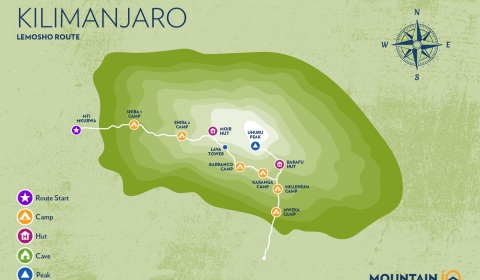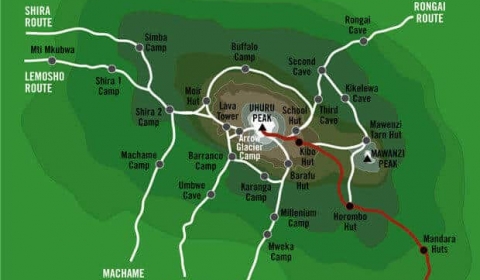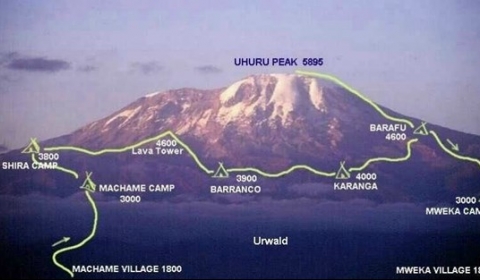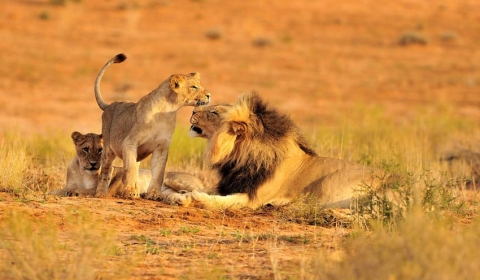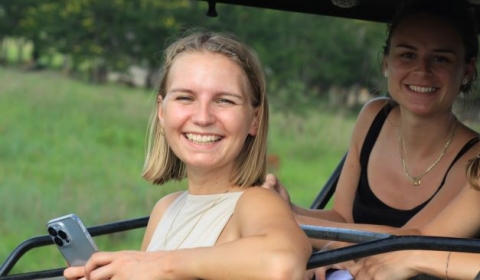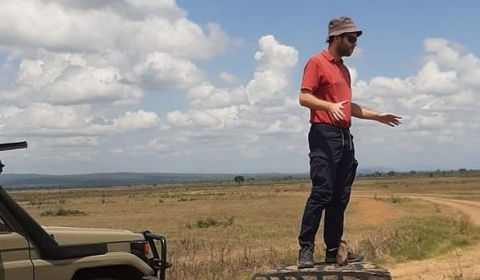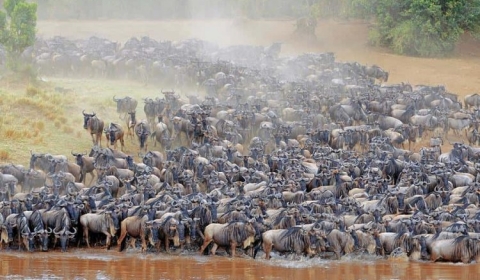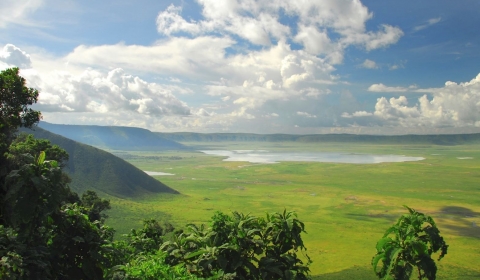Highlights
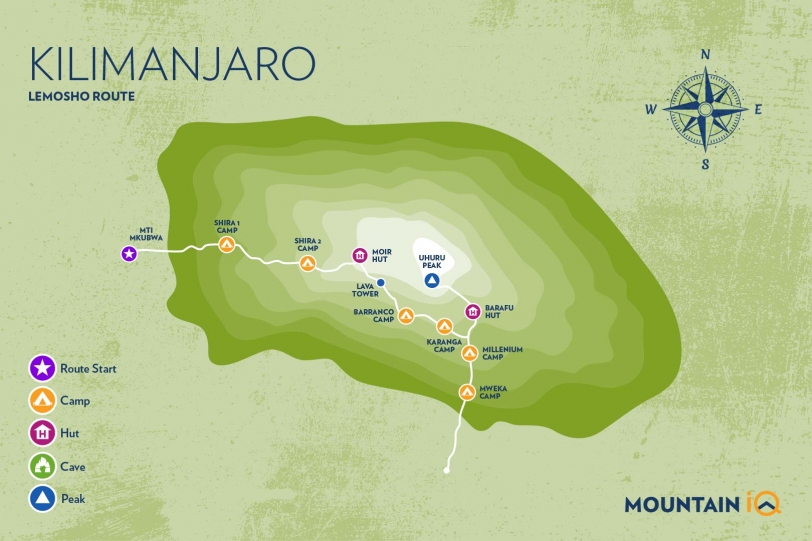
DURATION - 7 DAYS
Lemosho route is one of the best routes for acclimatization. The route is less used and a beautiful way up to the Shira Plateau. The route is one of the few where groups may be accompanied on the first day by an armed ranger, as the forests around the Lemosho Glades are inhabited by buffalo, elephant and other wildlife.
The minimum duration for the Lemosho route is 6 days, however we strongly recommend hiking the route in 7 days. The additional 7th day will give your body more time to acclimatize, reducing the effects of altitude sickness and give you more time to rest before attempting the summit
Itinerary
Pre-trek Briefing
If you have opted for the optional airport transfers, we will pick you up from Kilimanjaro Airport or Arusha airport and transfer you to your hotel in Moshi.
Pre-trek briefing at your Moshi hotel. You should be planning to arrive atleast one day before the start of the trek. Today we will spend in having a pre-trek briefing. We will also review your equipment and rent any equipment which is needed
Day 1: Hotel to Mti Mkubwa Camp
After breakfast and briefing, drive to Londorossi Park Gate (about a 3-hour drive). From here a forest track requiring a 4WD vehicle leads to Lemosho Glades. Walk along forest trails to Mti Mkubwa (big tree) campsite.
- Elevation: 1830m/6000ft to 2650m/8700ft
- Distance: 6km/4mi
- Hiking Time: 2-3 hours
- Habitat: Montane Forest
- Meals: Lunch and Dinner
Day 2: Mti Mkubwa Camp to Shira 2 Camp
After breakfast, we continue as the trail gradually steepens and enters the giant heather moorland zone. After several streams are crossed we continue over the Shira Ridge past the Shira 1 camp and on to the Shira 2 camp on moorland meadows by a stream.
- Elevation: 2650m/8700ft to 3850m/12,600ft
- Distance: 16km/10mi
- Hiking Time: 7-8 hours
- Habitat: Moorland
- Meals: Breakfast, Lunch and Dinner
Day 3: Shira 2 Camp to Barranco Camp
From the Shira Plateau we continue to the east up a ridge, passing the junction towards the peak of Kibo. As we continue, our direction changes to the South East towards the Lava Tower, called the “Shark’s Tooth” (elev 4650m/15,250ft). Shortly after the tower we come to the second junction which goes to the Arrow Glacier. We now continue down to the Barranco Camp. Although you end the day around the same elevation as when you began, this day is very important for acclimatization and will help your body prepare for summit day.
- Elevation: 3850m/12,600ft to 4000m/13,000ft
- Distance: 8km/5mi
- Walking Time: 5-6 hours
- Habitat: Semi-desert
- Meals: Breakfast, Lunch and Dinner
Day 4: Barranco Camp to Karanga Camp
After breakfast, we leave Barranco and continue on a steep ridge up the Barranco Wall to the Karanga Valley and the junction which connects with the Mweka Trail.
- Elevation: 4000m/13,000ft to 4050m/13,250ft
- Distance: 5km/3mi
- Climbing Time: 3-4 hours
- Habitat: Alpine Desert
- Meals: Breakfast, Lunch and Dinner
Day 5: Karanga Camp to Barafu Camp
We continue up to the Barafu Camp. You have completed the South Circuit, which offers views of the summit from many different angles. Here we make camp, rest, enjoy dinner, and prepare for the summit day.
- Elevation: 4050m/13,250ft to 4700m/15,350ft
- Distance: 4km/2mi
- Climbing Time: 3-4 hours
- Habitat: Alpine Desert
- Meals: Breakfast, Lunch and Dinner
Day 6: Barafu Camp to Summit to Mweka Camp
Very early in the morning (midnight to 2 am), we continue our way to the summit between the Rebmann and Ratzel glaciers. You head in a northwesterly direction and ascend through heavy scree towards Stella Point on the crater rim. This is the most mentally and physically challenging portion of the trek. At Stella Point you will stop for a short rest and will be rewarded with the most magnificent sunrise you are ever likely to see. Faster hikers may view the sunrise from the summit.
From Stella Point, you may encounter snow all the way on your 1-hour ascent to the summit. Once at Uhuru Peak you have reached the highest point on Mount Kilimanjaro and the continent of Africa!
From the summit we begin our descent by continuing straight down to the Mweka Camp, stopping at Barafu for lunch. You may want gaiters and trekking poles for the loose gravel going down. We arrive at Mweka Camp and enjoy our last evening on the mountain.
- Elevation: 4700m/15,350ft to 5895m/19,340ft
- Down to 3090m/10,150ft
- Distance: 5km/3mi up / 13km/8mi down
- Hiking Time: 5-7 hours up / 5-6 hours down
- Habitat: Stone scree and ice-capped summit
- Meals: Breakfast, Lunch and Dinner
Day 7: Mweka Camp to Mweka Gate to Hotel
After breakfast we continue the descent down to the Mweka Park Gate to receive your summit certificates. At lower elevations, it can be wet and muddy. Gaiters and trekking poles will help. Shorts and t-shirts will probably be plenty to wear (keep rain gear and warmer clothing handy)
Tanzaniagenic safaris vehicle will be waiting for you at Mweka gate to drive you back to your hotel in Moshi (around 60 minutes)
- Elevation: 3090m/10,150ft to 1680m/5500ft
- Distance: 10km/6mi
- Hiking Time: 3-4 hours
- Habitat: Forest
- Meals: Breakfast
Inclusions
- All transfers to the mountain and back to your Moshi hotel
- Professional, experienced, mountain guides
- Guides, Porters, Cook salaries and park fees
- Quality, waterproof, four-season mountain sleeping tents (on twin sharing basis)
- Sleeping Mattress
- Emergency Oxygen Cylinder
- All meals while on the Mountain
- Quality Mess tents with table and chairs
- Large portions of fresh, healthy, nutritious food
- Clean, purified drinking water
- Conservation fees (part of park fees)
- Camping or Hut fees (part of park fees)
- Rescue fees (part of park fees)
- VAT (18% charged by the Government)
- Kilimanjaro summit certificate
Exclusions
- Tanzania Visa
- International and domestic flights
- Hotel (available as an optional addon)
- Transfers (available as an optional addon)
- Personal trekking equipment such as sleepings bags, hiking boots, clothes, etc (available for renting)
- Tips and gratuities
- Travel insurance
- Personal Expenses (e.g. laundry, telephone, beverages, etc.)
- Meals not listed in the itinerary
- Liquors, beers and bottled beverages
- Surcharge for online payment of advance and balance (5% on each payment)

